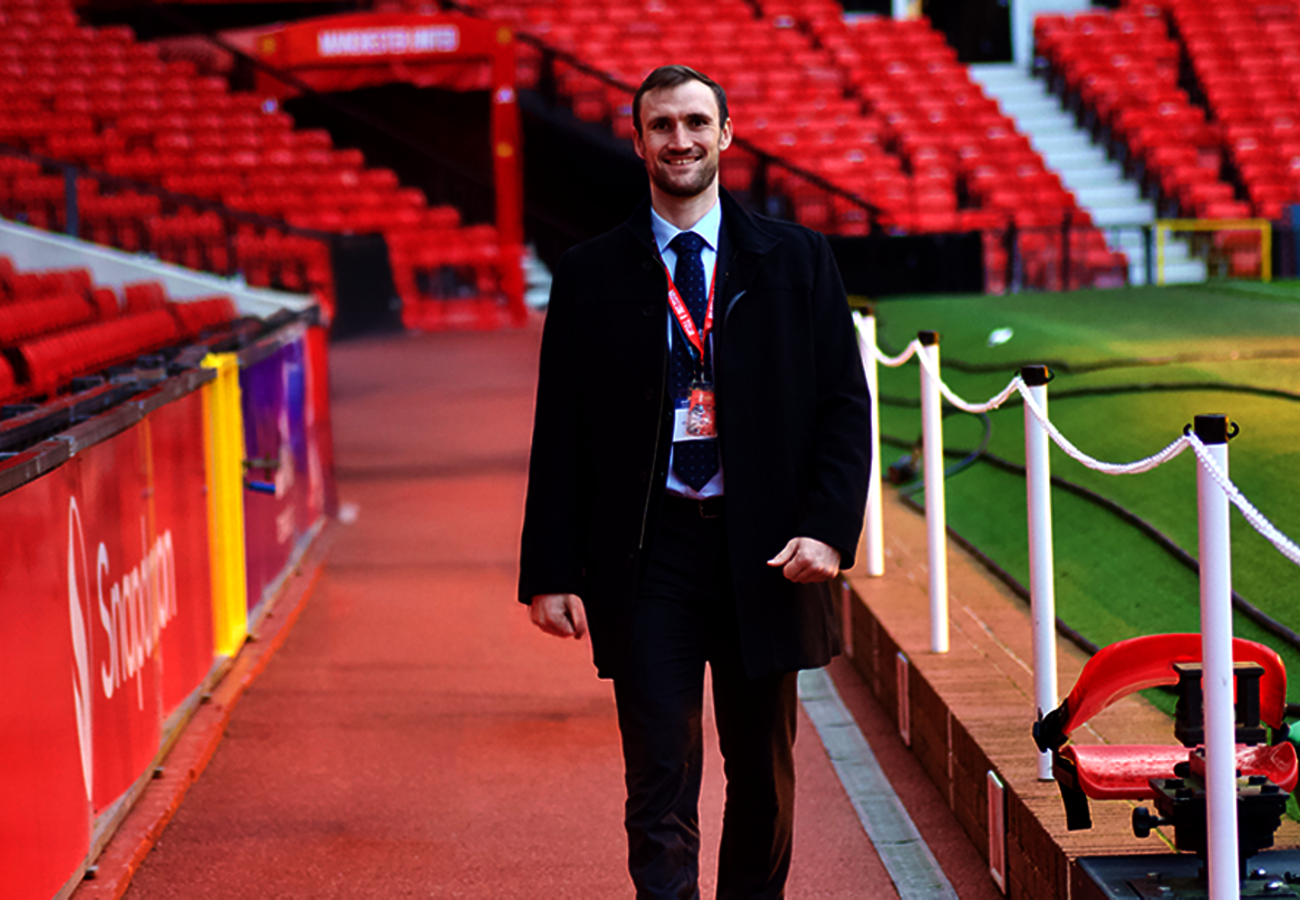BETWEEN STARTS - PHIL WILSON (FIFA MASTER 25th EDITION)

Phil Wilson’s story begins where it has always stayed: in constant motion. The Kiwi grew up outdoors, trying every sport. “I grew up with a ball at my feet sort of thing,” he says. “It was a very outdoors, park-based upbringing.”
By the time he was 10, he’d lived in Wellington, Sydney, Auckland and cycled through just as many sports: football, basketball, swimming, even handball.
But the fields weren’t always kind.
“I was also allergic to grass,” he reveals, grinning. Cricket meant long days in the field, made worse by his intolerance to ryegrass. “One time I came back to the house screaming, and my parents couldn’t recognise me. My face was blown up so much from the hay fever.” Still, sport stuck.
So did the water. His family had a boat, which meant summers tubing, skiing, and wakeboarding. “I guess I kind of grew up around water.” He didn’t know it then, but those early days gliding on the wake would be a subtle prelude to the most important boat he’d ever step into.
Even home didn’t stay still. When his family settled back in Wellington, his dad began renovating. “We calculated that I’d lived in seven different rooms in the house,” Phil says. “My room was one of the first to be renovated. I moved into the study, then the living room…It was normal to me.”
Those room changes also became soft training for the years ahead: camps, ferry crossings, hotel rooms. Movement would always feel more familiar than stillness.
The sports rotated too. He traded football for rugby. “The All Blacks are just up there on a pedestal,” he says. But rugby wasn’t the final stop. What started as off-season conditioning soon became something more.
“I’ve always just tried to play any sport under the sun,” Phil says. “That’s what drove me to try rowing.” Some of his rugby teammates were rowing in summer too, so he gave it a shot. “I just got hooked straight away.”
But it wasn’t just the sport. “I loved the trips. The towns. The time with the crew,” he says. “Going to new places was so much fun.” Cricket dropped off too. (“Probably for the best in terms of being able to breathe,” he jokes.)
Rowing became the constant – even if nothing else was. But it demanded consistency in return.
A knee injury forced the first major choice. “I had a meniscus tear in my right knee,” he says. “That kind of put it in perspective. I knew that if I wanted to give rowing a real crack, I needed to protect my body.” Rugby was out.
At 17, Phil earned a spot on New Zealand’s junior national team and moved away from home for an eight-week training block. “I was used to moving around.” He didn’t make the top crew at the Junior World Championships in Hamburg, but something else clicked. “I was still going, and I wanted to make the most of it.”
Somewhere in all of this, he started sketching out what the next few years might look like. “I had this ten-year plan for Tokyo,” he says. “My dad kept it. Might still have it.”
Many rowers consider college scholarships overseas. Phil stayed in New Zealand. “I thought staying in New Zealand was going to be the best way for me to get to the Olympics while pursuing my physiotherapy degree,” he says. But it wasn’t just a thought. It was strategy that made him bet on himself at home.
By 2018, Phil was in New Zealand’s men’s eight. But at the 2019 World Championships, they finished sixth, just outside the top-five cutoff needed to qualify for Tokyo.
Half a second. A blink. A heartbeat. That was the difference. “We were told if you didn’t qualify there, you weren’t going to Tokyo,” Phil says. “So, I thought that was it. Olympic dream over.”
But the crew pushed back. New Zealand hadn’t planned to send boats to the Final Olympic Qualification Regatta, aptly nicknamed the “regatta of death:” two spots, one race, no do-overs.
But they trained through the pandemic, often isolated, sometimes in garages. “It was cold. It was dark. We were just training and hoping it would all still matter.”
And in 2021, in Lucerne, it did. “The childhood dream was fulfilled,” he says. “I was going to the Olympics.”
The Games themselves, delayed a year, came with surreal stillness: empty streets, closed stands, a quiet city hosting the world. “We didn’t really get to see Japan,” Phil says. “But even then, the people were amazing.”
Inside the athletes’ village, surrounded by the New Zealand Olympic Team, something shifted. “It showed more of New Zealand’s identity than what we’d been part of in rowing. That connection to our culture, especially with no one else there, was pretty special.”
But their heat didn’t go to plan. “We just overdid it,” Phil says. “Half of us hadn’t been to the Olympics before.” They missed direct qualification and went into the repechage, a second-chance race they won in record time. “That was actually the fastest a New Zealand eight had ever gone.”
The final came fast. Phil barely slept but felt calm. “Someone told me once, it’s not the night before that matters. It’s the night before the night before.”
Even after a slow start, they were holding with the leaders by the halfway point. With 500 meters left, the finish line closed in. “I broke the rule and looked out. I got caught on camera too,” he chides himself aloud. “But I saw the Germans right beside us.”
Then the final sprint. Then the finish line. Then the board: 1 NZL.
“I just started yelling,” Phil says. “I told my teammate, ‘You’re an Olympic champion.’”
Somewhere in the chaos, he chugged a Sprite. The anthem played. The medal was heavy and his heart was full. “It took me three days to respond to all the messages.”
But what no one tells you about the podium is that you still have to climb down.
Phil’s second Olympic campaign was no longer about discovery. It was about proving he still belonged.
This time, the expectation was a medal. But the lead-up was messy. Injuries hit. First his pair partner. Then him. “For five weeks straight, we were just on stationary bikes next to each other,” he says. “But it strengthened the bond. We showed each other that we could go deep into the hurt locker when it counts.”
They arrived in Paris with one goal: make the final to get on the podium. But hard work doesn’t guarantee results. “We went too hard, too early in the semifinal,” Phil says. “We thought we were doing 1% more, but it was more like 5%.”
They missed the final by half a second.
“We just sat there, feet in the water,” he says. “It was hard to take.”
There was still the B final to race, which they won after leading by six seconds. It wasn’t redemption, but it was something. “You don’t always get a second chance in sport,” Phil says. “That one mattered.”
After Paris, Phil wasn’t ready to stop. But he didn’t know how to keep going. “I needed a break – for the mind, the body, and the heart.”
He finished his sport and exercise degree. Then said yes to something new: the FIFA Master. It wasn’t in the original plan, but it became part of a new one. “I wanted to learn about sport, not just compete in it.”
Moving through England, Italy, and Switzerland felt natural. But this time, it wasn’t rowing camps or fitness tests. It was lectures, group projects, and field visits to various sporting organisations. “I want to be able to make a difference in sport off the water, too,” he says. “Whether that’s helping athletes, improving systems, or just giving back to the environments I came through.”
LA 2028 is still a possibility. He knows what it would take. And what it would cost. “I’ve done this enough times now to know what I’m getting into,” he says. “But it’s really about not having regrets. I don’t want to cut myself short on a career I’ve worked so hard for. Everyone says you only get to do it once. Going to three Olympics would be insane.”
He might return to the boat. He might help build something outside of it. He might do both.
One thing is certain: Phil’s never been one to stay still. Not in a house, a boat, or within the confines of a plan. And maybe he never fully arrives, but maybe that’s what keeps him going.
By Geneva Decker
FIFA Master 25th edition student
FIFA Master - International Master in Management, Law and Humanities of Sport, ranked Europe's No.1 course a record 12 times by SportBusiness.
FIFA Master - 25 years of Excellence in Sport Business Education - organised by CIES in partnership with De Montfort University (UK), SDA Bocconi School of Management (Italy) and the University of Neuchâtel (Switzerland).









